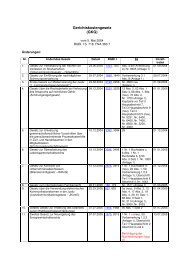The Netherlands Drug Situation 2010 - Trimbos-instituut
The Netherlands Drug Situation 2010 - Trimbos-instituut
The Netherlands Drug Situation 2010 - Trimbos-instituut
You also want an ePaper? Increase the reach of your titles
YUMPU automatically turns print PDFs into web optimized ePapers that Google loves.
tion has been initiated, namely the Platform Evidence-Based Guideline development(EBRO). About 30 Dutch professional organizations are member of the EBRO Platform.<strong>The</strong> targets of EBRO largely overlap with those of GIN (<strong>The</strong>uvenet et al. 2004).In conclusionEvidence-based guidelines, protocols, manuals, assistance documents, performance indicators,bench marking, total quality management, project management, performancemanagement, change management, innovation management, implementation management,break-through management, time management, case management, metamanagementof management development, Diagnosis Treatment Combinations, categoriesof intensity of care, and routine outcome monitoring: the target of all these managementtools was to improve the quality of the mental health care and the addictioncare.However, the evaluations reviewed above already showed that, apart from the positiveeffects, the abundance of 'management' has also had its drawbacks. In its manifesto"Power & Counter Power, Enough is Enough", the Steering Group "Enough is Enough" hassummarized the management drawbacks as follows: pressure on the real quality of care,quantity being more important than quality, systems for care being dominated by systemsfor production and accountability, production being more important than the client,more and more regulations and more and more amendments on the regulations, professionalsnot being taken seriously and professionals not being trusted, bureaucracy, and,last but not least, professionals wasting a lot of their precious time to more and moreregistration obligations to provide more and more information (Graafmans 2006).11.4 Comparison with the WHO guidelines on pharmacologicaltreatment of opiate dependenceIn this paragraph, a comparison will be made between Dutch guidelines and the WHOrecommendations on 1) choice of treatment, 2) opioid agonist maintenance treatment, 3)management of opioid withdrawal and 4) pregnancy. Data are used from the existing twoDutch guidelines on opiate treatment, that is the guideline on pharmacological maintenancetreatment of opiate dependence and the guideline on out- and inpatient detoxification.For each recommendation below, it is stated whether the guidelines in the <strong>Netherlands</strong>include this recommendation, even if not with exactly the same wording. According to theEMCDDA guidelines for drafting this paragraph, only one answer has been selected foreach recommendation.175




